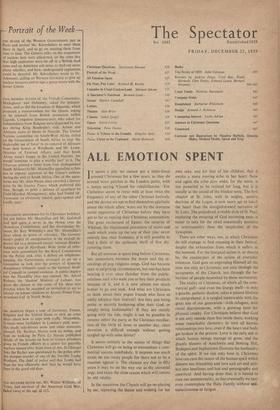ALL EMOTION SPENT
IT seems a pity we cannot put a stake-fence around Christmas for a few years, as they do around worn patches in the London parks, with a notice saying 'Closed for rehabilitation.' For Christmas seems to recur with at least twice the frequency of any of the other Christian festivals, and the devout are apt to find themselves apathetic about the whole affair, worn out by the immense social apparatus of Christmas before they have • got as far as making their Christmas communion. The great excitement of Easter, the surprise of . Whitsun, the illuminated procession of saints and souls which make up the rest of their year never entirely lose their freshness; it is still possible to find a little of the authentic thrill of first dis- covering them.
But all emotion is spent long before Christmas, lost somewhere between the stores and the re- cordings of pop religious songs. God has become man in surprising circumstances, but one has been hearing it ever since October from the public- relations men who want you to buy their products because of it, and it is now almost too much bother to go and look. And what are Christians to think about their pagan friends who have so oddly adopted their festival? Are they just being polite or secretly hankering after. their God, or simply being fashionable? If they are merely going with the tide, might it not be possible to remove either the party or the Christian recollec- tion of the birth of Jesus to another day, since devotion is difficult enough without getting tangled up with sales drives?
It seems unlikely in the nature of things that Christmas will go on being so tremendous a com- mercial success indefinitely. It imposes too much strain on too many people for there not to be a reaction against it. The chances are that in fifty years it may be on the way out as the universal orgy, and enjoy the close season which will restore its old vitality.
In the meantime the Church will go on playing by ear, repeating the theme and wishing for her
own sake, and for that of her children, that it awoke a more moving echo in her heart. Now and again the echo does wake, for the music is too powerful to be resisted for long, but it is usually at the sound of the bleaker texts. The first chapter of St. John, with its mighty, austere doctrine of the Logos, is now more apt to touch the heart than the straightforward narrative of St. Luke. The prejudiced, irritable style of St. Paul, exploring the meaning of God becoming man, is easier to take for the mind unnaturally sensitive to sentimentality than the simplicities of the Synoptists.
There are other ways, too, in which Christians do still manage to find meaning in their festival, despite the exhaustion from which it suffers at the moment. For the liturgical action is, or should be, the counterpart of the action of everyday existence. God goes on expressing Himself all the time not only at Christmas, not only through the sacraments of the Church, but through the be- haviour of people nourished by those sacraments.
The reality of Christmas, of which all the com- mercial guff—and even the liturgy itself—is only a gauche, pathetic shadow, takes a patient lifetime to comprehend: it is tangled inextricably with the great sins of our generation—with refugees, with racial discrimination, with a growing taste for .physical cruelty. For Christians believe that God is not only outside them but inside them, working some remarkable chemistry to turn all human relationships into love, even if the heart and body get broken in the process. Love is the only soil in which human beings manage to grow, and the ghastly blooms of Auschwitz and Notting Hill, Budapest and Sophiatown illustrate the husbandry of the spirit. If we can only bear it, Christmas love can cure the cancer of the human spirit which distorts our friendship and love and art and poli- tics into loneliness and lust and pornography and apartheid. And having done that, it is bound to cure our sentimentality, so that eventually we may even contemplate the Holy Family without self- consciousness or fatigue.


























 Previous page
Previous page